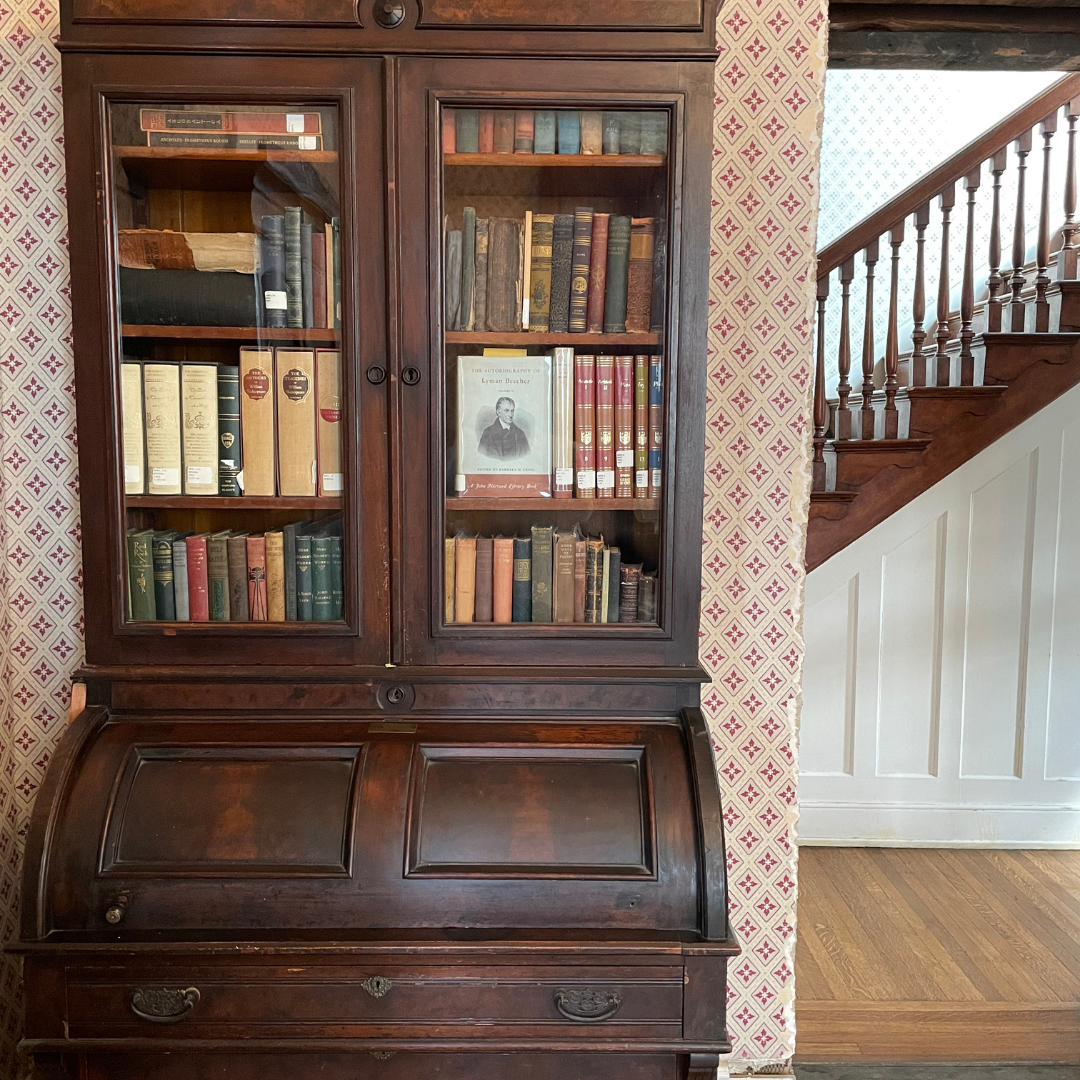|
In Lyman Beecher’s study, one of the front rooms at the Harriet Beecher Stowe House, one finds two secretary desks, each topped by a bookcase closed with a pair of glass doors. One has a plaque on it saying it was Dr. Beecher’s desk, an unverifiable statement, although we are told it came to the Stowe House from the Lane Seminary, where he was the President for its first 20 years. The books on its shelves are a miscellaneous collection, some Great Books, some not, meant to represent ones that might have been on the shelves in his time. One exception is the two-volume set The Autobiography of Lyman Beecher, edited for Harvard University Press by Barbara Cross. The publisher describes it as “… the colorful self-portrait of a central figure in American Protestantism... The Autobiography is a rich mosaic of records, reminiscences, and correspondence gathered by Beecher’s many children (among them, Harriet Beecher Stowe and Henry Ward Beecher).” The other secretary holds 45 book titles, of which 27 are by members of the Beecher family, while the rest treat them as subject matter. It’s a sampling of the literary output of a family in which nine of the thirteen children became writers, and it calls to mind two famous quips about them. Reverend Leonard Bacon wrote in 1863, the same year Lyman Beecher died, “This country is inhabited by saints, sinners, and Beechers,” and Unitarian minister Theodore Parker called Lyman “the father of more brains than any other man in America.” Those represented by just one title are: Lyman’s Six Sermons on Intemperance (1829); Edward’s The Papal Conspiracy (1855); and Charles’s Harriet Beecher Stowe in Europe (1896). There is one non-Beecher represented, Calvin Stowe, who edited and wrote the introduction to James Barr Walker’s Philosophy of the Plan of Salvation a Book for the Times by an American (1850). Henry Ward has 7 titles to his credit: Evolution & Religion (1855), Norwood: Village Life in New England (1868), Prayers from Plimouth (1887), Lectures to Young Men (1856), Plymouth Collection of Hymns & Tunes (1855), Beecher Sermons (1872), and Star Papers, or Experiences of Art & Nature (1855). Norwood was Henry Ward’s only venture into fiction, as Wikipedia explains: “In 1865, Robert E. Bonner of the New York Ledger offered Beecher twenty-four thousand dollars to follow his sister's example and compose a novel… Beecher stated his intent for Norwood was to present a heroine who is "large of soul, a child of nature, and, although a Christian, yet in childlike sympathy with the truths of God in the natural world, instead of books…” One review of the 549-page tome said, “to read through a novel so very long, so apparently interminable, and so amazingly dull as we are reluctantly constrained to consider Norwood to be, is a real triumph of endurance.” Not surprisingly 17 titles are from Harriet’s pen, including three editions of Uncle Tom’s Cabin. As subject Harriet is honored with 13 biographies, far outstripping the two of Henry Ward (Life of Beecher by Abbot & Halliday (1887) and Henry Ward Beecher: An American Portrait by Paxton Hibben (1942), and the one of the entire Beecher family, Milton Rugoff’s The Beechers (1981). One of the titles about Harriet deserves special mention: Harriet: A Play in 3 Acts (1945) by married writing team Florence Ryerson and Colin Clements, which ran for a year on Broadway in 1943. It was dedicated “for Eleanor Roosevelt” and starred Helen Hayes, of whom Time Magazine wrote “But Actress Hayes, acting with her usual skill, aging with her usual art, creates, if not a great and rounded woman, a bustling housewife who is also sore beset.” Finally, there is one title on the shelves that is only distantly related to the Beechers – Herland (1915) by feminist Charlotte Perkins Gilman, which Wikipedia describes as a utopian novel that “describes an isolated society composed entirely of women, who bear children without men (parthenogenesis, a form of asexual reproduction). The result is an ideal social order: free of war, conflict, and domination.” Gilman’s great-grandfather on her father’s side was Dr. Lyman Beecher, and she revered her great-aunt Harriet Beecher Stowe. Four of the nine members in the Beecher party that arrived in Cincinnati in 1832 produced in their lifetimes 90 titles. Wikipedia credits Lyman with 17 published works, daughters Catherine and Harriet with 22 and 34 respectively, and son Henry Ward with 17. Add to that the 26 titles contributed by sons Edward (12) and Charles (14), and it comes to 116 titles! Visitors can find many books by or about Harriet for sale at the HBS House bookstore. Several others described above are in the collection of the Cincinnati and Hamilton County Public Library housed on the second floor. I encourage you to look for them when you come for a tour. About the author:
Frederick Warren is a docent at the Harriet Beecher Stowe House, as well as a tour guide for the Friends of Music Hall. He is a retired estimator for a book printing and binding firm in Cincinnati.
1 Comment
|
Archives
March 2025
Categories
All
|
|


 RSS Feed
RSS Feed